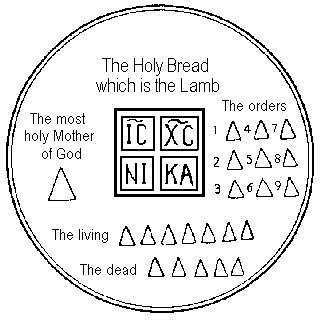
...But since in this dialogue Socrates is about to derogate pleasure and Philebus has called pleasure, "Venus," he hastens to make atonement, fearing a goddess' name especially as a pious man should. Atonement is the restoration of holiness that has been destroyed. Holiness is devotion to holy things...
-Marsilio Ficino, The Philebus Commentary
Eneadum genetrix hominum divumque voluptas,
Alma Venus coeli subter labentia signa
Quae mare navigerum quae terras frugiferentes
Concelebras; per te quoniam genus omne animatum
Concipitur, visitque exortum lumina solis.
-Lucretius, De Rerum Natura
The sanctuary at the seminary church in La Reja has an area between two pillars that leads to the apse with the side altars. There, on the epistle side, the professor of liturgy was waiting in the wings and watching attentively. On the altar, a recently ordained priest was saying the 11:30 a.m. Mass. I watched my professor watch the new priest. He was making sure that the man on the altar was saying his Mass right: that he was making all of the Signs of the Cross correctly, that the genuflections were graceful and not twitchy, that he was saying not his Mass too quickly, etc., etc. This was a Mass you had to learn how to say, and new priests were game to be critiqued if they are not performing the cult properly.
This was in the Society of St. Pius X, but I am sure every traditionalist religious order has some of these concerns. The flip side of the Motu Proprio cheerleading has been expressed by some, but I will say it explicitly. Oftentimes the old Mass, for better or for worse, was a chore that had to be endured and far from a spiritual experience. Many priests hated saying the old Mass, and many who remember it now probably said, "good riddance" to it back then. The fact is that the liturgical reform of the 1960's was the destruction of the old liturgical ethos of the Roman Church and the creation of a new one. I would summarize it very briefly by saying that before, liturgy was something you had to DO, and now it is something that you have to UNDERSTAND.
Indeed, when the divine causes and the human preparations resembling them are united in one and the same act, the acomplishment of the sacrifice achieves all things and bestows great blessings.
-Iamblichus, De Mysteriis
Catechisms from the 1950's often talked about the necessity of sacrifice in human culture, and those sacrifices needing to be accomplished through a certain set of rules. Sacrifice, for better of for worse, always has a cause and effect mechanism behind it: the sacrifice is done correctly, and the blessings are bestowed. The SSPX put out a document earlier this decade stating that the reform of the liturgy had much to do with the putting aside of the idea of Anselm's idea of Christ's sacrifice on the Cross being primarily vicarious satisfaction for the sins of the world and its replacement with the idea of the "Paschal Mystery", something supposedly more ill-defined and Patristic. This is, according to the Lefebvrist theologians, the reason why the idea of the Mass as a sacrifice that takes away sins is no longer emphasized.
In this sacrificial culture, then, the actions of my seminary professor-priest make much more sense. Even if it is not explicitly stated, the very human (read: pagan) idea of accomplishing the cult correctly was at the heart of the rubricism before the Second Vatican Council. The Mass was something that had to appease the wrath of God against sinful humanity. Therefore, it had to be accomplished according to a complicated set of rules, in a language no one could understand, and having parts that were uttered secretly by the priest. (One commenter said that he likes the Mass for the text, which I find highly ironic since most of the "text" was not meant to be heard by the laity anyway.) These were principals that were never defined, but they were nevertheless in the "back of the mind" of Western civilization.
I will not say one way or the other whether or not this idea is correct. And it is still present to some extent even in many Masses said according to the Pauline Missal. (People still have Masses said for particular intentions.) But the Liturgical Movement and the Novus Ordo Missae were very much concessions to the idea of liturgy that was first put forward by the Reformers and some Catholic voices. Having moved away from the theology of vicarious satisfaction, liturgy is conceived of as something more for the people as the Body of Christ and less for a wrathful and distant God receiving again the Blood of His Son. It is the remembrance of what Christ has done for us in His life, death, and resurrection. Hence, the greater freedom in how it is carried out, the vernacular tongue, and the general emphasis on interaction between the people. It is admitted by virtually all that this has led to abuses and many undignified things take place during these ceremonies. The degree of gravity, however, of the wrongness of what goes on during these ceremonies depends on what you conceive the liturgy as primarily being. If it is an act of the cult of sacrifice, it is a grave transgression against the order of things. If it is a manifestation of the synaxis of the People of God, it is just people behaving rowdily. Has anyone gone to Hell because of a liturgical abuse?
The bottom line is that these divergent cultures are so distinct now that to think that one can influence the other amounts to wishful thinking. The ethos behind one is completely different from the ethos behind the other. While aesthetic radicals like myself love Gregorian chant, Latin, and all of the highly stylized gestures of the old rite, many Catholics who remember them are just glad they do not have to "do that crap" anymore. The ecclesial cultures behind both rites are just too divergent now, and let us face facts: traditionalists constitute a tiny fraction of total Catholics in the world. Even with a greater allowance of the old rite, the only thing that will emerge in my opinion is a niche market style of liturgies similar to Anglican praxis of "churchmanships". Perhaps it will not fracture the Church, but it will not serve to unite it either. Then again, maybe nothing will.
So I am glad that the Holy Father finally put out his Motu Proprio. I even read it in the original Latin. But part of me fears that this is just "his thing". He may have very good reasons for it, but it may all just be a case of trying to put something back into Pandora's liturgical box.


















